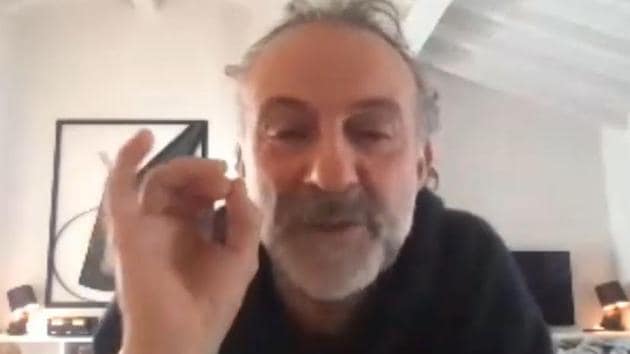‘Pandemic has transformed the act of cooking, eating’, says master chef Massimo Bottura
Bottura also discussed the return of simplicity. During the lockdown in Italy, Bottura and his family — his wife Lara and children Alexa and Charlie — started a series called Kitchen Quarantine to showcase easy-to-replicate recipes.
The act of cooking is an ethical choice. Let’s start asking where our food comes from, and how to secure its future. That was the Italian master chef Massimo Bottura, best known for the three-Michelin-starred restaurant Osteria Francescana in Modena, and his pandemic-era Instagram series Kitchen Quarantine, speaking at the Hindustan Times Leadership Summit on Thursday.

Recognising that a pandemic-era world has given everyone a newfound relationship with food — some have turned to it for comfort, others have taken to it to calm strained nerves, and many have cooked more variedly than before — Bottura, the Thailand-based Indian chef Gaggan Anand, best known for his two-Michelin-starred restaurant Gaggan, and the Indian chef Ritu Dalmia discussed the lockdown as a period of reinvention and discovery and, most importantly, as a wake-up call.
“Covid-19 [disease] has been a big threat to fine dining,” Anand said. “Restaurants are closing. Chefs I know are jobless.” Unfortunately that was neither recognised nor addressed by the government, Dalmia added, going on to talk about how restaurants in India were left to bear the brunt of the pandemic on their own. “We have to now live with what remains. These are rare and precious days, with silence and stillness, and we have to do something to deserve them,” Bottura told Dalmia, who asked him about his efforts at giving back even while running a world-class restaurant and a guesthouse.
Bottura also discussed the return of simplicity. During the lockdown in Italy, Bottura and his family — his wife Lara and children Alexa and Charlie — started a series called Kitchen Quarantine to showcase easy-to-replicate recipes. “One of the things I did during this period is ask myself a lot of questions,” Bottura said. “What is the purpose of a restaurant in the 21st century? Is it a place to have a meal… a place that promotes culture, connects to agriculture, promotes education, learning, growth. These connections are important to keep us from being isolated in our kitchens, to keep us connected to our communities and the world.”
Speaking about the soup kitchens run by the humanistic, cultural project Food for Soul started by his wife and him, Bottura said that chefs could indeed make a difference in the world by choosing what they serve at the table. “[Chefs] can affect agriculture, tourism, culture...” he said. Asked how the pandemic was likely to change our world view when it came to food, Anand said, “We are living in a world waiting for hope. Covid is a time to rediscover our culture. The whole idea of pickling was all about avoiding waste.” The real challenge now, he added, would be for every chef to stop and think about how they wanted to go forward. “Do we go back to what we were doing? Or do we rethink.”
“If you look at the last 20 years, social media, microwave ovens and the fast-food culture became part of society,” he added. “But people started cooking at home during Covid. Making an egg… which was difficult in the modern world of the workaholic. These people can now recognise chefs as important people in society. Not just a doctor or an army man, but chefs, especially in India, where chefs are in the last category of choice in career,” he said.
Speaking of the act of cooking as an ethical choice, Bottura pointed out that we ought to “start asking ourselves where our food comes from”. “Better food education means a better future for food. [There is a need to] re-educate adults about how to shop, cook and eat. Remind the public to use their voice through what they have chosen to buy. Can we encourage a food system that favours sustainability and reinforce local production, and respect for the produce and the people who make them,” he said.
The session ended with a round of rapid-fire questions posed by Dalmia, in which Anand picked a Ferrari over a bicycle, tofu over paneer and ravioli over dimsum (that last, much to Bottura’s delight). Asked to name an ingredient he hated, Bottura picked arrogance and said that his favourite secret midnight snack was defrosted pizza, and, after some initial hesitation, picked Indian over Chinese takeaway. Jesus Christ is the historical figure he would most like to cook for, he added. “I would to make the best piece of bread ever, break it and share it with him,” he said.






